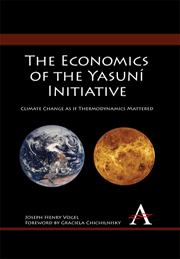Book contents
- Frontmatter
- Contents
- Prologue
- Foreword
- Introduction
- Acknowledgements
- Abbreviations and Acronyms
- The Economics of the Yasuní Initiative
- Chapter 1 Thermodynamics
- Chapter 2 The Tragedy of the Commons
- Chapter 3 The Willful Ignorance of Realpolitik
- Chapter 4 The General Theory of Second Best
- Chapter 5 Through the Bottleneck of a Cowboy Economy
- Conclusions
- Appendix: Annotated YouTube Filmography
- Ordering
- Notes
- Index
Chapter 1 - Thermodynamics
The Language Chosen Defines the Debate
Published online by Cambridge University Press: 05 March 2012
- Frontmatter
- Contents
- Prologue
- Foreword
- Introduction
- Acknowledgements
- Abbreviations and Acronyms
- The Economics of the Yasuní Initiative
- Chapter 1 Thermodynamics
- Chapter 2 The Tragedy of the Commons
- Chapter 3 The Willful Ignorance of Realpolitik
- Chapter 4 The General Theory of Second Best
- Chapter 5 Through the Bottleneck of a Cowboy Economy
- Conclusions
- Appendix: Annotated YouTube Filmography
- Ordering
- Notes
- Index
Summary
“Sunk costs” is a useful concept. Its definition in economic theory has many expressions in popular speech. The favorites seem to be “don't spend good money after bad” and “let bygones be bygones.” In less colloquial language, decisions should be taken on the basis of future benefits related to future costs and not on the basis of past costs. One should not let a poor prior decision color the decision to be taken now. Nevertheless, they do and that is why “sunk costs” is such a useful concept. The seemingly endless American wars in Afghanistan and Iraq are a good example. Politics explains why presidents and prime ministers do not apply the concept of sunk costs. In matters as grave as war, reversal of course is an admission of a monstrous error. So, to avoid paying the political price, the powers-that-be will “kick the can down the road” and ignore the concept of sunk costs. In the case of the simultaneous American wars, the price tag is already estimated in the trillions of dollars.
Economic theory is not much different. Its conceptual framework now exhibits sunk costs and nowhere is this more evident than in climate change and the intertwined mass extinction crisis. I italicize the adverb “now” to emphasize that at one time the benefits of the framework were greater than the costs, but that time has long since past. When did it pass? Why did it pass? And what exactly do I mean by economic theory?
- Type
- Chapter
- Information
- The Economics of the Yasuní InitiativeClimate Change as if Thermodynamics Mattered, pp. 1 - 12Publisher: Anthem PressPrint publication year: 2010
- 1
- Cited by



